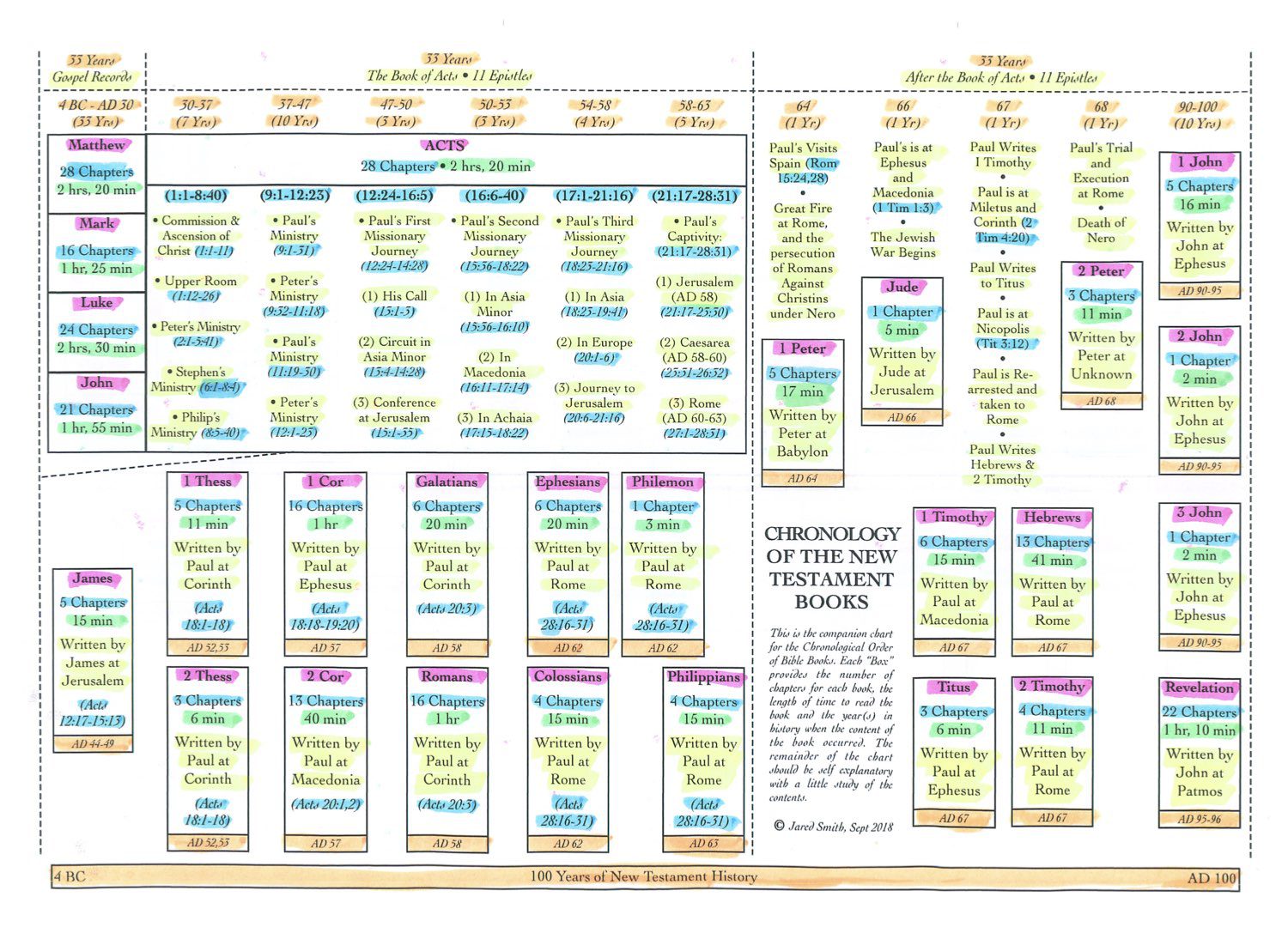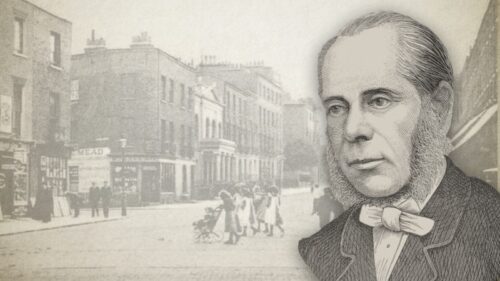
The Letter Of Paul To Titus
The Background
I believe the letter of Paul to Titus was written in the year 67AD, making it the twelfth of his fourteen epistles. The chart below provides a bird’s-eye view of the chronological order for the books of the New Testament.

John Gill, “Commentary On The New Testament Scriptures”:
“Titus, to whom this epistle is inscribed, was a Greek, an uncircumcised Gentile, and so remained; nor did the apostle circumcise him, as he did Timothy, when he became his companion; nor did the apostles at Jerusalem oblige him to be circumcised, when Paul took him with Barnabas along with him thither, (Galatians 2:1,3). He was a man of great grace, and large gifts, and very dear to the apostle: he calls him his brother, his partner, and fellow helper, and says he walked in the same spirit, and in the same steps, (2 Corinthians 2:13 8:23 12:18). He was employed by the apostle much, and sent into various parts, on different occasions: he sent him to Corinth, to finish there the collection for the poor saints at Jerusalem, (2 Corinthians 8:6,16,17) and to Dalmatia, to know the state of the saints there, and to confirm them in the faith, (2 Timothy 4:10). As he was a Greek, so his name is a Greek name, yet used among the Romans, as Titus Vespasian, and others; and among the Jews, so we read of R. Chijah bar sjyj, “Titas”, and of R. Judah ben Titas: when and where this epistle was written, is not very easy to determine; some think it was written between the first and second time the apostle was in bonds at Rome; and certain it is, that he was not in bonds when he wrote it, for he desires Titus to meet him at Nicopolis, (Titus 3:19) from whence some have supposed it to be written, as the subscription shows; but others think it was wrote much earlier, and when the apostle was at Ephesus, towards the close of his three years stay there, before he went into Macedonia; but it seems rather that it was written when he returned from Macedonia into Greece: he left Titus at Crete, and staying in Greece three months, he intended to have sailed to Syria, but was prevented by the Jews lying in wait for him, upon which he steered his course to Macedonia again; and as he was going there, or when there, writes this letter to Titus, to come to him at Nicopolis. The occasion of it was partly the judaizing preachers, and false teachers, that got into that island, and were corrupting the principles of the people; and partly the unbecoming conversation and practices of some professors of religion: and whereas the apostle had left Titus in Crete, to finish what he had begun, and to put the churches in order, and see that they had proper officers, particularly pastors over them, that they might be taken care of, both with respect to doctrine and practice; the design of this epistle is to lay before Titus the several qualifications of a pastor, which might be instruction to him, and to the churches, in the choice and ordination of them; and to stir him up to zeal and diligence in refuting false teachers, and dealing with heretics; and to put him upon exhorting the saints to the discharge of their duty, in every branch of it, from the best principles, by arguments taken from the grace of God, and the doctrines of it. This epistle is supposed to be written about the year 55.”
Robert Hawker, “Bible Chapter Summaries And Reflections”:
”This Epistle of Paul to Titus is but short, though highly interesting, and we have much cause to bless GOD the HOLY GHOST for it very clear marks of the LORD’S inspiration are discoverable in it.
It is supposed by some to have been written from Rome; and others have thought that Paul wrote it from Ephesus. In either case the time must differ, though it generally bears the date of our LORD GOD 55.
The Person to whom Paul wrote it, is in several parts of the Apostle’s other writings spoken of in very high terms of affection. Paul calls him Titus his own son, and his brother and partner and fellow helper; and as one who walked in the same spirit; and in the same steps. 2 Corinthians 12:18. see also Galatians 2:1-3. 2 Corinthians 8:23. So that he was evidently very dear to Paul.
The subject of the Epistle is generally concerning the blessed doctrines of the Gospel; and directions to Titus concerning the ministry. I beg the Reader to enter upon the perusal of it, on the knee of prayer, that the Almighty Author of his written Word, may lead the souls of his people by it, to the uncreated WORD, and bless it in JESUS CHRIST.”
“All scripture is given by inspiration of God [inclusive of Paul’s letter to Titus], and is profitable for doctrine, for reproof, for correction, for instruction in righteousness: that the man of God may be perfect, throughly furnished unto all good works.”—2 Timothy 3:16,17
Editor, Jared Smith
The Letter
Paul, a servant of God, and an apostle of Jesus Christ, according to the faith of God’s elect, and the acknowledging of the truth which is after godliness; In hope of eternal life, which God, that cannot lie, promised before the world began; But hath in due times manifested his word through preaching, which is committed unto me according to the commandment of God our Saviour; To Titus, mine own son after the common faith: Grace, mercy, and peace, from God the Father and the Lord Jesus Christ our Saviour. For this cause left I thee in Crete, that thou shouldest set in order the things that are wanting, and ordain elders in every city, as I had appointed thee: If any be blameless, the husband of one wife, having faithful children not accused of riot or unruly. For a bishop must be blameless, as the steward of God; not selfwilled, not soon angry, not given to wine, no striker, not given to filthy lucre; But a lover of hospitality, a lover of good men, sober, just, holy, temperate; Holding fast the faithful word as he hath been taught, that he may be able by sound doctrine both to exhort and to convince the gainsayers. For there are many unruly and vain talkers and deceivers, specially they of the circumcision: Whose mouths must be stopped, who subvert whole houses, teaching things which they ought not, for filthy lucre’s sake. One of themselves, even a prophet of their own, said, The Cretians are alway liars, evil beasts, slow bellies. This witness is true. Wherefore rebuke them sharply, that they may be sound in the faith; Not giving heed to Jewish fables, and commandments of men, that turn from the truth. Unto the pure all things are pure: but unto them that are defiled and unbelieving is nothing pure; but even their mind and conscience is defiled. They profess that they know God; but in works they deny him, being abominable, and disobedient, and unto every good work reprobate. But speak thou the things which become sound doctrine: That the aged men be sober, grave, temperate, sound in faith, in charity, in patience. The aged women likewise, that they be in behaviour as becometh holiness, not false accusers, not given to much wine, teachers of good things; That they may teach the young women to be sober, to love their husbands, to love their children, To be discreet, chaste, keepers at home, good, obedient to their own husbands, that the word of God be not blasphemed. Young men likewise exhort to be sober minded. In all things shewing thyself a pattern of good works: in doctrine shewing uncorruptness, gravity, sincerity, Sound speech, that cannot be condemned; that he that is of the contrary part may be ashamed, having no evil thing to say of you. Exhort servants to be obedient unto their own masters, and to please them well in all things; not answering again; Not purloining, but shewing all good fidelity; that they may adorn the doctrine of God our Saviour in all things. For the grace of God that bringeth salvation hath appeared to all men, Teaching us that, denying ungodliness and worldly lusts, we should live soberly, righteously, and godly, in this present world; Looking for that blessed hope, and the glorious appearing of the great God and our Saviour Jesus Christ; Who gave himself for us, that he might redeem us from all iniquity, and purify unto himself a peculiar people, zealous of good works. These things speak, and exhort, and rebuke with all authority. Let no man despise thee. Put them in mind to be subject to principalities and powers, to obey magistrates, to be ready to every good work, To speak evil of no man, to be no brawlers, but gentle, shewing all meekness unto all men. For we ourselves also were sometimes foolish, disobedient, deceived, serving divers lusts and pleasures, living in malice and envy, hateful, and hating one another. But after that the kindness and love of God our Saviour toward man appeared, Not by works of righteousness which we have done, but according to his mercy he saved us, by the washing of regeneration, and renewing of the Holy Ghost; Which he shed on us abundantly through Jesus Christ our Saviour; That being justified by his grace, we should be made heirs according to the hope of eternal life. This is a faithful saying, and these things I will that thou affirm constantly, that they which have believed in God might be careful to maintain good works. These things are good and profitable unto men. But avoid foolish questions, and genealogies, and contentions, and strivings about the law; for they are unprofitable and vain. A man that is an heretick after the first and second admonition reject; Knowing that he that is such is subverted, and sinneth, being condemned of himself. When I shall send Artemas unto thee, or Tychicus, be diligent to come unto me to Nicopolis: for I have determined there to winter. Bring Zenas the lawyer and Apollos on their journey diligently, that nothing be wanting unto them. And let ours also learn to maintain good works for necessary uses, that they be not unfruitful. All that are with me salute thee. Greet them that love us in the faith. Grace be with you all. Amen.
Paul The Apostle (?-68AD) was a sovereign grace Baptist preacher. He was appointed by Christ to serve as an Apostle, sent out to the wider regions of the world ministering the gospel primarily to the Gentiles. He is the author of fourteen New Testament letters—1 Thessalonians, 2 Thessalonians, 1 Corinthians, 2 Corinthians, Galatians, Romans, Ephesians, Colossians, Philemon, Philippians, 1 Timothy, Titus, Hebrews and 2 Timothy.





